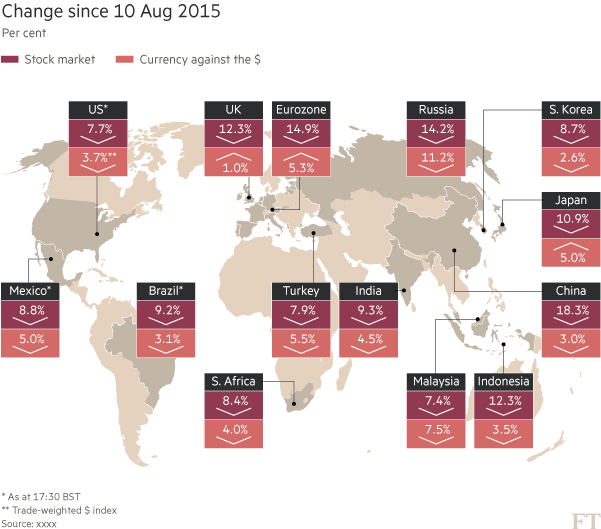How will the fall on China’s stockmarkets affect the global economy?

When Greece agreed a third bailout with European creditors in July, economists were reassured that one of the big risks for the global economy in 2015 would not materialise. A benign summer beckoned.
Instead, fears for the global economy have intensified. And since the epicentre of trouble is not one of Europe’s smallest economies but China, one of the world’s biggest, the potential impact is much greater.
Whether through its sheer size, importance to commodity exporting economies or ability to shake global confidence, China’s economic challenges are reverberating through financial markets and threatening the world economy.
Economists are not yet pressing the panic button. Although many forecasters are marking down global growth estimates for 2016, they still tend to be higher than those for 2015.
Antonio Garcia Pascual of Barclays, for example, still expects growth rates in emerging and advanced economies to rise through the rest of this year with the world economy expanding 3.7 per cent in 2016 compared with 3.2 per cent this year.
Willem Buiter, chief economist of Citigroup, notes the global economy is “at a highly delicate point” and is cutting his 2016 growth forecast for China, Japan and other emerging economies in Asia and Latin America. But he still expects economic conditions to improve next year.
Others say comparisons with previous recent global financial crises are weak. Unlike in 1997, for example, Asian economies are not seeking to defend doomed exchange rate pegs that protected their companies’ foreign currency borrowing. Stock markets are not as obviously overvalued as they were in the 2000 dot.com bubble. And financial institutions are not toppling as they were in the 2008 global crisis.
“We think that recent events more resemble previous summer sell-offs, which were subsequently quickly reversed, than past emerging market crises,” said David Rees, a senior markets economist at consultants Capital Economics.
Some economists find the market reaction hard to understand or rationalise. Erik Nielsen, chief economist of UniCredit, accused investors of suffering from “hypochondria . . . [where] every bit of news is seen as disaster in progress”.
Part of the reason for economists’ relative calm can be explained by China’s role in the global economy. Despite its size, China is not seen as a bellwether. Andrew Brigden of Fathom Consulting says: “As the world’s biggest net exporter, the world means more to China than China does to the world.”
Economists are, however, noticing that the economic data in most countries — with the exception of the UK and Canada — are generally worse than expected and there has been a definitive loss of momentum in many economies this year.
Jasper McMahon of Now-Casting.com, a consultancy that summarises all the latest economic data, says: “Our forecast of US GDP [gross domestic product] growth for 2015 has been revised down by almost 1 percentage point since February. This now coincides with significant deceleration in China, and faltering momentum in the euro area. Although we do not predict another recession, the risk has clearly increased.”

If economists are correct that the risks are rising but outlook does not point to a severe downturn, the question is what might change to shift that view. Two possible amplifiers of crisis, and two potential dampeners, stand out.
Economists will watch to see whether confidence, or what Keynes called “animal spirits”, has been damaged sufficiently to stop companies spending money. In autumn 2008, investment suddenly stopped in many economies around the world as companies put plans on hold, creating a vicious circle of corporate caution and economic contraction.
Second, all eyes will be on the financial system to see whether market volatility creates sufficient losses to threaten the health of financial institutions. The collapse of banks in 2008 rapidly transmitted more losses and even greater fear across the world. Policymakers will hope that improved buffers in the financial sector will prevent the failure of systemically important institutions.
Working to help stabilise the global economy are falls in oil and other commodity prices, which act as a tax break for consumers, giving them more money to spend. In addition, policymakers can run more stimulative economic policies than they otherwise might with the Federal Reserve deliberating over a decision whether to raise US interest rates in September.
But no one can know in advance how falls in equity prices will affect the global economy. As 2008 demonstrated, what might seem like a containable crisis can quickly spin out of control. The current consensus is therefore highly contingent.
So long as households remain willing to spend, economists say, the increase in purchasing power from cheaper petrol will offset the loss of global economic momentum from China and this still underpins much of the hope for faster economic growth in 2016.
This article is published in collaboration with The Financial Times. Publication does not imply endorsement of views by the World Economic Forum.
To keep up with the Agenda subscribe to our weekly newsletter.
Author: The Financial Times covers, comments and analyses the latest UK and international business, finance, economic and political news.
Image: A Chinese national flag flutters at the headquarters of a commercial bank on a financial street. REUTERS.
Don't miss any update on this topic
Create a free account and access your personalized content collection with our latest publications and analyses.
License and Republishing
World Economic Forum articles may be republished in accordance with the Creative Commons Attribution-NonCommercial-NoDerivatives 4.0 International Public License, and in accordance with our Terms of Use.
The views expressed in this article are those of the author alone and not the World Economic Forum.
Stay up to date:
China
Related topics:
Forum Stories newsletter
Bringing you weekly curated insights and analysis on the global issues that matter.
More on Financial and Monetary SystemsSee all
Jaime Magyera
November 13, 2025






